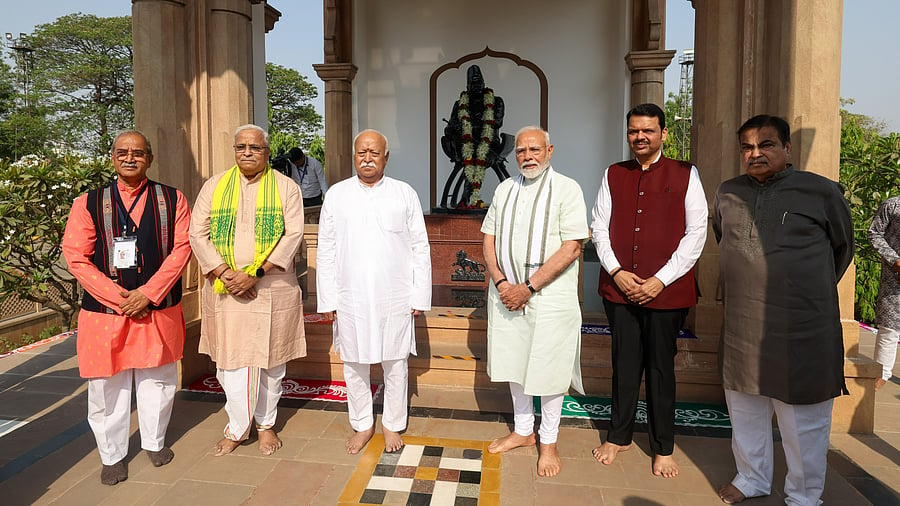
RSS chief Mohan Bhagwat, former Sangh general secretary Suresh Bhaiyyaji Joshi, Maharashtra Chief Minister Devendra Fadnavis and Union minister Nitin Gadkari, both hailing from Nagpur, were present during Modi’s visit to the Smruti Mandir in Reshimbagh, the administrative headquarters of the RSS.
Credit: X/@narendramodi
Mumbai: Coinciding with the centenary of the Rashtriya Swayamsevak Sangh (RSS), Prime Minister Narendra Modi described it as modern “Akshay Vat” of the immortal culture of India, saying that the seed of thought sown 100 years ago for the preservation and promotion of national consciousness, which has now grown into a great tree.
“RSS is the modern Akshay Vat of the immortal culture of India; this Akshay Vat is continuously energizing Indian culture and the consciousness of our nation,” he said in Nagpur, which houses the RSS headquarters.
On this arrival, Modi, who was accompanied by RSS chief Dr Mohan Bhagwat, visited the Hedgewar Smruti Mandir at Reshimbagh, which houses the memorial of the first two Sarsanghchalaks - Dr Keshav Baliram Hedgewar and Dr Keshav Baliram Hedgewar and Madhav Sadashivrao Golwalkar coinciding with the Gudi Padwa festivities.
The Smruti Mandir, which conducts the training camps for RSS volunteers (Swayamsevaks), is located near Hedgewar Bhavan, the headquarters of RSS.
Later, Modi visited Deekshabhoomi and paid tributes to Dr Babasaheb Ambedkar, the chief architect of the Constitution.
Thereafter, the Prime Minister laid the foundation stone of the extension building of Madhav Netralaya Premium Centre, which is inspired by Guru Golwalkar.
This is the first time that a sitting PM would be visiting the Hedgewar Smruti Mandir complex.
Former PM Atal Bihari Vajpayee had visited the complex in 2007.
Speaking at the inaugural function, Modi showered praise on the RSS and described how it is playing an important role in nation-building.
“Countless people like me derive inspiration and strength from the thoughts of Param Pujya Doctor Sahab and Pujya Guruji. It was an honour to pay homage to these two greats, who envisioned a strong, prosperous and culturally proud Bharat,” he said.
The PM pointed out that when service becomes ingrained in values, it transforms into a form of devotion, which is the essence of every RSS volunteer's life. “This spirit of service inspires generations of volunteers to dedicate themselves tirelessly,” he said.
The Prime Minister remarked on the contrasting circumstances during the establishment of the RSS in 1925, a time marked by struggle and the overarching goal of independence.
He reiterated his vision, as shared during the construction of Shri Ram's temple in Ayodhya, to lay the foundation for a strong India for the next thousand years.
The Prime Minister expressed confidence that the guidance of luminaries like Dr. Hedgewar and Guruji will continue to empower the nation. He concluded by affirming the resolve to fulfill the vision of a developed India and honor the sacrifices of generations.
Recalling Guruji's words that the significance of life lies not in its duration but in its utility, Modi emphasized the commitment to duty, guided by the principles of "Dev to Desh" and "Ram to Rashtra."
Modi remarked on the selfless work of volunteers in various fields, whether in border villages, hilly regions, or forest areas. He highlighted their involvement in initiatives like Vanvasi Kalyan Ashrams, Ekal Vidyalayas for tribal children, cultural awakening missions, and Seva Bharati's efforts to serve the underprivileged.
Lauding the exemplary work of volunteers during the Prayag Mahakumbh, where they assisted millions through the Netra Kumbh initiative, he emphasized that wherever there is a need for service, volunteers are present. He remarked on the disciplined response of volunteers during disasters like floods and earthquakes, highlighting their selflessness and dedication to service.
Modi noted that India is now replacing remnants of colonialism, carried for 70 years with inferiority, with new chapters of national pride.
“We have replaced outdated British laws designed to demean Indians with the new Bharatiya Nyay Sanhita. We are seeing the transformation of Rajpath into Kartavya Path, symbolizing duty over colonial legacy. The removal of colonial symbols from the Navy's flag, which now proudly features the emblem of Chhatrapati Shivaji Maharaj,” he said.
PM visits Deekshabhoomi
Modi also visited Deekshabhoomi in Nagpur and hailed it as a symbol of social justice and empowerment of the downtrodden. It was in Deekshabhoomi that Dr Babasaheb Ambedkar embraced Buddhism on 14 October 1956.
"Deekshabhoomi in Nagpur stands tall as a symbol of social justice and empowering the downtrodden. Generations of Indians will remain grateful to Dr Babasaheb Ambedkar for giving us a Constitution that ensures our dignity and equality,” Modi said, adding: “Our government has always walked on the path shown by Babasaheb, and we reiterate our commitment to working even harder to realise the India he dreamt of.”